Here's what the ASPCA (The American Society for the Prevention of Cruelty to Animals) has to say about separation anxiety in dogs:
One of the most common complaints of pet parents is that their dogs are disruptive or destructive when left alone. Their dogs might urinate, defecate, bark, howl, chew, dig or try to escape. Although these problems often indicate that a dog needs to be taught polite house manners, they can also be symptoms of distress. When a dog’s problems are accompanied by other distress behaviors, such as drooling and showing anxiety when his pet parents prepare to leave the house, they aren’t evidence that the dog isn’t house trained or doesn’t know which toys are his to chew. Instead, they are indications that the dog has separation anxiety. Separation anxiety is triggered when dogs become upset because of separation from their guardians, the people they’re attached to. Escape attempts by dogs with separation anxiety are often extreme and can result in self-injury and household destruction, especially around exit points like windows and doors.
Some dogs suffering from separation anxiety become agitated when their guardians prepare to leave. Others seem anxious or depressed prior to their guardians’ departure or when their guardians aren’t present. Some try to prevent their guardians from leaving. Usually, right after a guardian leaves a dog with separation anxiety, the dog will begin barking and displaying other distress behaviors within a short time after being left alone—often within minutes. When the guardian returns home, the dog acts as though it’s been years since he’s seen his mom or dad!
When treating a dog with separation anxiety, the goal is to resolve the dog’s underlying anxiety by teaching him to enjoy, or at least tolerate, being left alone. This is accomplished by setting things up so that the dog experiences the situation that provokes his anxiety, namely being alone, without experiencing fear or anxiety.
Common Symptoms of Separation Anxiety
The following is a list of symptoms that may indicate separation anxiety:
Urinating and Defecating
Some dogs urinate or defecate when left alone or separated from their guardians. If a dog urinates or defecates in the presence of his guardian, his house soiling probably isn’t caused by separation anxiety.
Barking and Howling
A dog who has separation anxiety might bark or howl when left alone or when separated from his guardian. This kind of barking or howling is persistent and doesn’t seem to be triggered by anything except being left alone.
Chewing, Digging and Destruction
Some dogs with separation anxiety chew on objects, door frames or window sills, dig at doors and doorways, or destroy household objects when left alone or separated from their guardians. These behaviors can result in self-injury, such as broken teeth, cut and scraped paws and damaged nails. If a dog’s chewing, digging and destruction are caused by separation anxiety, they don’t usually occur in his guardian’s presence.
Escaping
A dog with separation anxiety might try to escape from an area where he’s confined when he’s left alone or separated from his guardian. The dog might attempt to dig and chew through doors or windows, which could result in self-injury, such as broken teeth, cut and scraped front paws and damaged nails. If the dog’s escape behavior is caused by separation anxiety, it doesn’t occur when his guardian is present.
Pacing
Some dogs walk or trot along a specific path in a fixed pattern when left alone or separated from their guardians. Some pacing dogs move around in circular patterns, while others walk back and forth in straight lines. If a dog’s pacing behavior is caused by separation anxiety, it usually doesn’t occur when his guardian is present.
Coprophagia
When left alone or separated from their guardians, some dogs defecate and then consume all or some of their excrement. If a dog eats excrement because of separation anxiety, he probably doesn’t perform that behavior in the presence of his guardian.
Why Do Some Dogs Develop Separation Anxiety?
There is no conclusive evidence showing exactly why dogs develop separation anxiety. However, because far more dogs who have been adopted from shelters have this behavior problem than those kept by a single family since puppyhood, it is believed that loss of an important person or group of people in a dog’s life can lead to separation anxiety. Other less dramatic changes can also trigger the disorder. The following is a list of situations that have been associated with development of separation anxiety.
Change of Guardian or Family
Being abandoned, surrendered to a shelter or given to a new guardian or family can trigger the development of separation anxiety.
Change in Schedule
An abrupt change in schedule in terms of when or how long a dog is left alone can trigger the development of separation anxiety. For example, if a dog’s guardian works from home and spends all day with his dog but then gets a new job that requires him to leave his dog alone for six or more hours at a time, the dog might develop separation anxiety because of that change.
Change in Residence
Moving to a new residence can trigger the development of separation anxiety.
Change in Household Membership
The sudden absence of a resident family member, either due to death or moving away, can trigger the development of separation anxiety.
Medical Problems to Rule Out First
Incontinence Caused by Medical Problems
Some dogs’ house soiling is caused by incontinence, a medical condition in which a dog “leaks” or voids his bladder. Dogs with incontinence problems often seem unaware that they’ve soiled. Sometimes they void urine while asleep. A number of medical issues—including a urinary tract infection, a weak sphincter caused by old age, hormone-related problems after spay surgery, bladder stones, diabetes, kidney disease, Cushing’s disease, neurological problems and abnormalities of the genitalia—can cause urinary incontinence in dogs. Before attempting behavior modification for separation anxiety, please see your dog’s veterinarian to rule out medical issues.
Medications
There are a number of medications that can cause frequent urination and house soiling. If your dog takes any medications, please contact his veterinarian to find out whether or not they might contribute to his house-soiling problems.
Other Behavior Problems to Rule Out
Sometimes it’s difficult to determine whether a dog has separation anxiety or not. Some common behavior problems can cause similar symptoms. Before concluding that your dog has separation anxiety, it’s important to rule out the following behavior problems:
Submissive or Excitement Urination
Some dogs may urinate during greetings, play, physical contact or when being reprimanded or punished. Such dogs tend to display submissive postures during interactions, such as holding the tail low, flattening the ears back against the head, crouching or rolling over and exposing the belly. For more information about this problem, please see our article, Submissive Urination.
Incomplete House Training
A dog who occasionally urinates in the house might not be completely house trained. His house training might have been inconsistent or it might have involved punishment that made him afraid to eliminate while his owner is watching or nearby. For help with house training, please see our articles, House Training Your Adult Dog and House Training Your Puppy.
Urine Marking
Some dogs urinate in the house because they’re scent marking. A dog scent marks by urinating small amounts on vertical surfaces. Most male dogs and some female dogs who scent mark raise a leg to urinate. For more information about urine marking and how to resolve it, please see our article, Urine Marking in Dogs.
Juvenile Destruction
Many young dogs engage in destructive chewing or digging while their guardians are home as well as when they’re away. Please see our articles, Destructive Chewing and Digging, for more information about these problems.
Boredom
Dogs need mental stimulation, and some dogs can be disruptive when left alone because they’re bored and looking for something to do. These dogs usually don’t appear anxious.To learn about fun, effective ways to combat boredom and spice up your dog’s life, please see our articles, Enriching Your Dog’s Life,Exercise for Dogs and How to Stuff a KONG® Toy.
Excessive Barking or Howling
Some dogs bark or howl in response to various triggers in their environments, like unfamiliar sights and sounds. They usually vocalize when their guardians are home as well as when they’re away. For more information about this kind of problem, please see our articles, Barking and Howling.
Separation anxiety has little to do with training or discipline; the behaviors are a result of the severe panic your dog feels when you're not there. Left untreated, it causes damage to your house and belongings — and serious psychological suffering for your dog.
To learn more about what to do if your dog has separation anxiety, check out the original article over at the ASPCA's website.
Source: ASPCA
Photo: BlogAbove

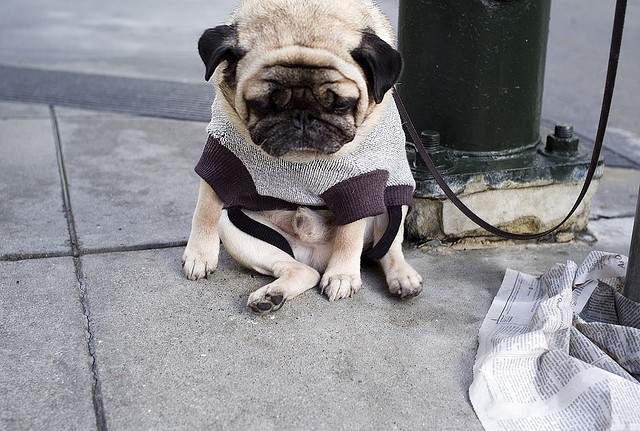
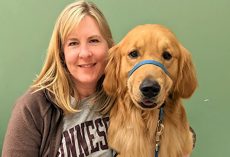
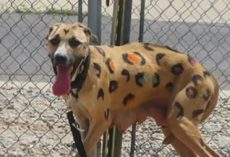


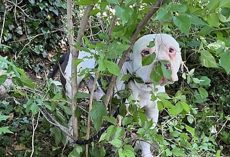
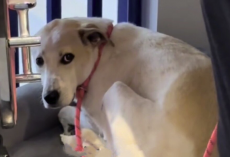

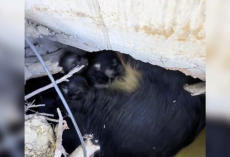

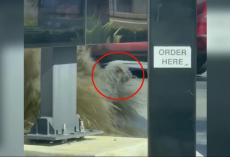
Priscilla Weikert
- Edit
I’m so sorry about your furbabe. It’s been 7 years since T passed & all my kids (even though 2 never knew her) talk about her & all the funny stories they’ve heard of her. She was my first baby & made me a better person, a better mother. I love her today as much as I lived her then. I just haven’t been able to get another Boxer yet, although one day I know I will. I now have labs but there is nothing more precious than a baby Boxer & no character greater!!
Sergio Valencia
- Edit
Vanessa
Emilee Mullican
- Edit
She doesn’t
Ted Panaretos II
- Edit
Here’s a great idea for Cassius! Amanda Panaretos
Brian Clemson
- Edit
Susan Clemson
Christopher Matthew
- Edit
Alixandra max
Andrew Falk
- Edit
Kennel training is a must for boxers
Mark Lunsford
- Edit
Yes my boxer goes nuts when I leave
David Hartzell
- Edit
Ashley Becker Hartzell
Ryan Olvera
- Edit
Annika Valdez-Olvera she don’t I do lol
Connie Bisson
- Edit
Cathy Wojtkowiak no anxiety for your dog….just hydroponics
Adam Hartzell
- Edit
Alexis Amanda Nicole Shows
Elizabeth Heaton
- Edit
Yes and No
Fee Jardine
- Edit
Derek
Derek Jardine
- Edit
Omg YES
Fee Jardine
- Edit
Derek Jardine poor slinky
Regina Brown
- Edit
Priscilla Brown Wright Taz
Priscilla Brown Wright
- Edit
No he’s just psychotic. LOL
Lash Larreau
- Edit
LEAVE A TV OR A RADIO ON WHEN YOU LEAVE .
Babzz Arterberry
- Edit
Yes. Seriously
Anita Snofl
- Edit
not mine but Sonja Snofl-Ens dog does soooo funny
Anita Snofl
- Edit
hes so hillarious when you guys go lmao
Anita Snofl
- Edit
hes not rediculous hes a sweetheart –it shows so much how he feels about his family –we dont mind showing him its all right to be sad–hes so lovable when hes lonely and sad and comes to me to comfort him -I dont know if its my voice or my human smell that were related but he sensed comfort in me and it makes me happy that i can give it to him
Michaela Brazel
- Edit
Dale Hart
Dale Hart
- Edit
Shelley Hart
Mary Weeks
- Edit
Poor baby ❤
Debby Pina
- Edit
Oh yes really bad
Lillian Luchetti-Garcia
- Edit
Yes, he does.
Lori Seitz
- Edit
Dont know my boxer never leaves my side..
Sandra Sue
- Edit
Yes!!!!